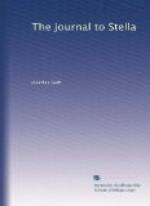20 Lady Catherine Morice (died 1716) was the eldest daughter of Thomas Herbert, Earl of Pembroke, and wife of Sir Nicholas Morice, Bart., M.P. for Newport.
21 Perhaps Henry Arundell, who succeeded his father as fifth Baron Arundell of Wardour in 1712, and died in 1726.
22 Antoine, Abbe de Bourlie and Marquis de Guiscard, was a cadet of a distinguished family of the south of France. He joined the Church, but having been driven from France in consequence of his licentious excesses, he came to England, after many adventures in Europe, with a recommendation from the Duke of Savoy. Godolphin gave him the command of a regiment of refugees, and employed him in projects for effecting a landing in France. These schemes proving abortive, Guiscard’s regiment was disbanded, and he was discharged with a pension of 500 pounds a year. Soon after the Tories came to power Guiscard came to the conclusion that there was no hope of employment for him, and little chance of receiving his pension; and he began a treacherous correspondence with the French. When this was detected he was brought before the Privy Council, and finding that everything was known, and wishing a better death than hanging, he stabbed Harley in the breast. Mrs. Manley, under Swift’s directions, wrote a Narrative of Guiscard’s Examination, and the incident greatly added to the security of Harley’s position, and to the strength of the Government.
23 Harley’s surgeon, Mr. Green.
24 See Letter 9, note 20.
25 Mrs. Walls’ baby (see Feb 5, 1711).
26 The phrase had its origin in the sharp practices in the horse and cattle markets. Writing to Arbuthnot in 1727, Swift said that Gay “had made a pretty good bargain (that is a Smithfield) for a little place in the Custom House.”
27 “There.”
Letter 18.
1 See Swift’s paper in the Examiner, No. 32, and Mrs. Manley’s pamphlet, already mentioned.
2 Presumably Mrs. Johnson’s palsy-water (see Letter 5, note 17).
3 Thomas Wentworth, Baron Raby (1672-1739), was created Viscount Wentworth and Earl of Strafford in June 1711. Lord Raby was Envoy and Ambassador at Berlin for some years, and was appointed Ambassador at the Hague in March 1711. In November he was nominated as joint Plenipotentiary with the Bishop of Bristol to negotiate the terms of peace. He objected to Prior as a colleague; Swift says he was “as proud as hell.” In 1715 it was proposed to impeach Strafford, but the proceedings were dropped. In his later years he was, according to Lord Hervey, a loquacious and illiterate, but constant, speaker in the House of Lords.
4 A beauty, to whom Swift addressed verses in 17O8. During the frost of January 17O9 Swift wrote: “Mrs. Floyd looked out with both her eyes, and we had one day’s thaw; but she drew in her head, and it now freezes as hard as ever.” She was a great friend of Lady Betty Germaine’s.




